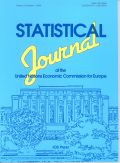Authors: Garonna, Paolo | Sofia, Francesca
Article Type:
Research Article
Abstract:
The end of this century is characterised by a renewed interest in national questions. On the one hand, one sees the discovery of cultural heritage and the demand for recognition by numerous minorities. On the other, the internationalisation of economic processes leads to the questioning of traditional memberships and the emphasis on subjective elements in the choice of “nation”. With this scenario in mind, the authors set out to investigate the relationship between statistics and the processes of nation-building in European history. In fact, there is a correspondence in timing between the affirmation of the principle of nationality and the
…diffusion of statistical science and practices in XIX century Europe. How can this correspondence be explained? Did statistics carry out an instrumental role or did it condition the development of “nationhood”? Two factors acted as an intermediary between statistics and the nationality principle: the beginnings of the modern notions of political economy and public opinion. Working on these two levels, statistics was called to define a coherent network for the different civil societies (The “nations”). Statistics showed that it could adjust to the social, cultural, and economic changes occurring within each community. For example, the development of labour statistics was instrumental to the extension of citizenship to the working class at the beginning of this century. In general, statistics carried out a highly relevant role of “monitoring” the needs expressed by the civil society, cooperating in the codification of the national identity drawn from science to knowledge, rather than myths, symbols and flags. Statistics, in short, was a formidable tool for “social cohesion” in the various nation States: the more prepared it was to lead to values of tolerance and sharing in the demands expressed by the civil society, the more effective it was. Naturally, within each national experience, the specific components necessary to insure the public relevance of statistics acted differently. For example, during the XIX century “political economy” was prevalent where there were deep economic transformations, such as in Great Britain during the industrial revolution. Conversely, the public administration became the focal point when the nation was understood as a product of history, rather than a natural fact, as in the French case. Finally, science seemed to prevail in those contexts, as in Germany and Belgium, where the scientific method was acclaimed for its autonomous, “constitutional” role. Statistics is called to work on these same elements today, continuing to make the fundamental contribution that it has rendered in the past, and responding to the new technological and institutional challenges of the future.
Show more
DOI: 10.3233/SJU-1997-14106
Citation: Statistical Journal of the United Nations Economic Commission for Europe,
vol. 14, no. 1, pp. 51-70, 1997
Price: EUR 27.50





